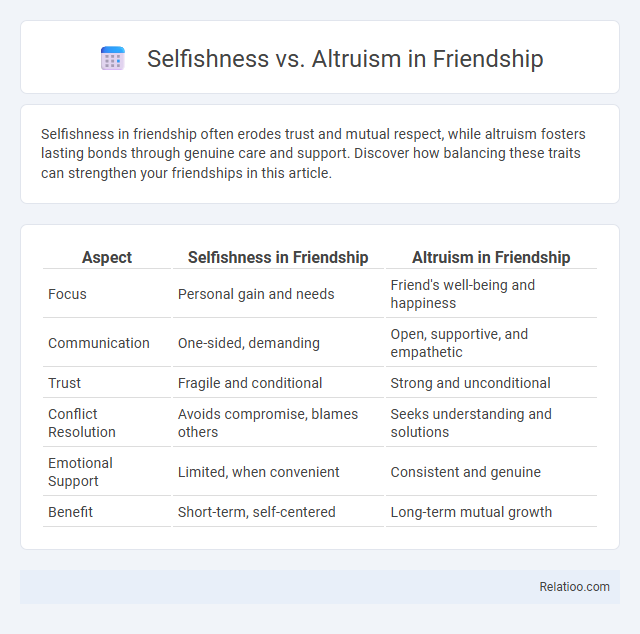Selfishness in friendship often erodes trust and mutual respect, while altruism fosters lasting bonds through genuine care and support. Discover how balancing these traits can strengthen your friendships in this article.
Table of Comparison
| Aspect | Selfishness in Friendship | Altruism in Friendship |
|---|---|---|
| Focus | Personal gain and needs | Friend's well-being and happiness |
| Communication | One-sided, demanding | Open, supportive, and empathetic |
| Trust | Fragile and conditional | Strong and unconditional |
| Conflict Resolution | Avoids compromise, blames others | Seeks understanding and solutions |
| Emotional Support | Limited, when convenient | Consistent and genuine |
| Benefit | Short-term, self-centered | Long-term mutual growth |
Defining Selfishness and Altruism in Friendship
Selfishness in friendship is characterized by prioritizing one's own needs and desires over the well-being of friends, often leading to imbalanced and strained relationships. Altruism in friendship involves selflessly supporting and valuing friends' happiness and needs, fostering trust and mutual respect. Defining these concepts highlights how selfish actions undermine emotional bonds, whereas altruistic behaviors strengthen friendship dynamics through empathy and reciprocity.
Psychological Roots of Selfish and Altruistic Behaviors
Selfishness in friendship often stems from psychological roots such as insecurity, fear of scarcity, or unmet emotional needs, driving individuals to prioritize their own interests over others'. Altruistic behaviors are frequently rooted in empathy, secure attachment styles, and the desire for social bonding, encouraging acts of generosity and support within friendships. Understanding these psychological foundations reveals how personal experiences and emotional regulation influence the balance between self-interest and compassion in social relationships.
The Role of Self-Interest in Healthy Friendships
Self-interest plays a crucial role in maintaining healthy friendships by ensuring personal boundaries and mutual respect are upheld, preventing exploitation. When both parties prioritize their well-being alongside others, they foster balanced relationships that blend altruism with self-preservation. This dynamic supports sustainable connections where individual needs and collective harmony coexist effectively.
Altruism: The Foundation of Deep Social Bonds
Altruism forms the foundation of deep social bonds by fostering trust and mutual support within friendships, differentiating it from selfishness, which centers on individual gain. Your willingness to act selflessly strengthens connections, promotes emotional resilience, and encourages reciprocal kindness in social interactions. Prioritizing altruistic behaviors over selfish motives leads to more meaningful, lasting relationships that enrich both personal and communal well-being.
Recognizing Signs of Selfishness in Friends
Recognizing signs of selfishness in friends involves observing consistent behaviors where your needs and feelings are disregarded in favor of their own interests. Selfish friends often dominate conversations, expect favors without reciprocation, and show little empathy during your difficult times. You can maintain healthier friendships by identifying these patterns early and setting clear boundaries to protect your emotional well-being.
How Altruism Enhances Emotional Wellbeing
Altruism in friendship significantly boosts emotional wellbeing by fostering trust, empathy, and mutual support, creating a positive feedback loop that reduces stress and enhances happiness. Your altruistic actions toward friends promote feelings of belonging and acceptance, which contribute to lower anxiety and increased life satisfaction. Prioritizing others' needs in friendships strengthens social bonds and cultivates resilience against emotional hardships.
The Impact of Selfishness on Long-Term Relationships
Selfishness in long-term relationships often erodes trust and emotional connection, leading to increased conflicts and feelings of neglect. Altruism, by contrast, fosters empathy and mutual support, strengthening the bond between friends. Your ability to prioritize others' needs over personal gain significantly impacts the durability and quality of your friendships.
Balancing Self-Care and Altruism in Friendships
Balancing self-care and altruism in friendships requires recognizing the importance of meeting one's own needs while supporting friends empathetically. Excessive selfishness undermines trust and connection, whereas unchecked altruism risks personal burnout and emotional depletion. Establishing boundaries ensures mutual respect, fosters sustainable relationships, and cultivates a healthy dynamic where both parties feel valued and understood.
Strategies to Foster Altruistic Behaviors
Fostering altruistic behaviors in friendships requires intentional strategies that promote empathy, active listening, and mutual respect, encouraging You to prioritize others' needs alongside your own. Implementing practices like expressing gratitude, setting shared goals, and engaging in cooperative activities strengthens the foundation of trust and reciprocity essential for altruism. These approaches not only reduce selfish tendencies but also cultivate deeper, more meaningful connections rooted in genuine care and support.
Building Lasting Friendships Through Mutual Support
Building lasting friendships hinges on balancing selfishness and altruism, where mutual support becomes the foundation for trust and emotional growth. Prioritizing both personal needs and the well-being of friends fosters a dynamic of reciprocity, enhancing relationship resilience. Studies show friendships grounded in mutual support exhibit greater satisfaction and longevity, as both parties feel valued and understood.

Infographic: Selfishness vs Altruism in friendship
 relatioo.com
relatioo.com